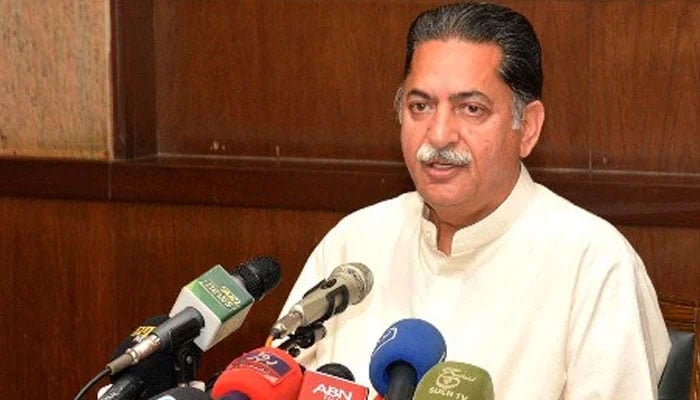Superpower concerned despite no curbs on PTI: Latif
He said that group of people, who pose threat to country, cannot be called political party
LAHORE: Senior PMLN leader Mian Javed Latif has said that the superpower has expressed its concern, although there is no restriction on the Pakistan Tehreek-e-Insaf (PTI.
At a press conference, he said that a group of people, who pose a threat to the country, cannot be called a political party.
He said that the PTI had stopped work on the CPEC, and now its founder has said he will close phase two of the CPEC. He stressed that the country cannot afford any trouble now.
He said the PTI is only being considered for a ban; it has not been banned yet. He said that the Tehrik-e-Labaik was banned during the PTI’s era, and today they are screaming, crying, and propagating alleged facilitation.
Javed Latif said the PTI founder wanted to impose strict IMF conditions, and efforts were being made to create conditions like those in Kenya. He emphasised that the country is no longer capable of facing difficult conditions. He remarked that no one seems concerned about Pakistan’s current conditions. “No one calls it a political party that threatens the country,” he maintained.
The PMLN leader urged that all stakeholders should come together and that the secret hands that weakened the state should be exposed. He said that if having Pakistan’s interests at heart is a crime, the whole nation should commit this crime, and will not allow anyone to stop phase two of the CPEC. He also called on politicians to end personal biases against each other and focus on the country’s development.
-
 Hailee Steinfeld Reveals Her Plans To Return To Music
Hailee Steinfeld Reveals Her Plans To Return To Music -
 Elon Musk Unveils SpaceX Plan For Civilian Moon, Mars Trips
Elon Musk Unveils SpaceX Plan For Civilian Moon, Mars Trips -
 MTG Commander Banned Update: Wizards Frees Infamous Instant-win Card
MTG Commander Banned Update: Wizards Frees Infamous Instant-win Card -
 Royal Family Braces For ‘final Blow’ As Andrew Scandal Deepens
Royal Family Braces For ‘final Blow’ As Andrew Scandal Deepens -
 Snow Forecast Warns Of Reduced Visibility And Travel Risks In Ontario
Snow Forecast Warns Of Reduced Visibility And Travel Risks In Ontario -
 Margot Robbie Reveals 'worst' Gift She Received From Co-star
Margot Robbie Reveals 'worst' Gift She Received From Co-star -
 Casey Wasserman Says He ‘deeply Regrets’ Ghislaine Maxwell Emails After DOJ File Release
Casey Wasserman Says He ‘deeply Regrets’ Ghislaine Maxwell Emails After DOJ File Release -
 Discord Face Scan Age Verification Rules Explained As Platform Tightens Access
Discord Face Scan Age Verification Rules Explained As Platform Tightens Access -
 Cavaliers Vs Nuggets Showdown Heats Up After Blockbuster Trade
Cavaliers Vs Nuggets Showdown Heats Up After Blockbuster Trade -
 Where Kelsea Ballerini, Chase Stokes Stand After Second Breakup
Where Kelsea Ballerini, Chase Stokes Stand After Second Breakup -
 'Disgraced' Andrew Hit With Reality Of Life Beyond Royal Bubble
'Disgraced' Andrew Hit With Reality Of Life Beyond Royal Bubble -
 Thunder Vs Lakers: LeBron James Playing As Lakers Miss Luka Dončić
Thunder Vs Lakers: LeBron James Playing As Lakers Miss Luka Dončić -
 Pistons Vs Hornets Recap: Brawl Erupts With 4 Players Getting Tossed Before Detroit Victory
Pistons Vs Hornets Recap: Brawl Erupts With 4 Players Getting Tossed Before Detroit Victory -
 Gordie Howe Bridge Faces Uncertainty After Trump Warning To Canada
Gordie Howe Bridge Faces Uncertainty After Trump Warning To Canada -
 Air Canada’s Flights To Cuba Halted As Aviation Fuel Crisis Worsens
Air Canada’s Flights To Cuba Halted As Aviation Fuel Crisis Worsens -
 Marc Anthony Weighs In On Beckham Family Rift
Marc Anthony Weighs In On Beckham Family Rift




